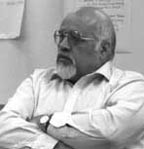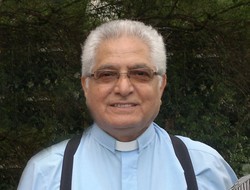At the Iranian Presbyterian Fellowship in the Berlin district of Neukölln, pastor Sadegh Sepheri and social worker Aziz Sadaghiani ― both Presbyterian Church (U.S.A.) mission co-workers ― provide spiritual and practical assistance to Farsi-speaking immigrants. Sadegh leads Sunday services and Bible studies in Farsi, both for long-time Christians and for recent converts.
Aziz came to Germany as a student more than 30 years ago. A licensed clinical social worker, he has wide-ranging experience in dealing with German courts and administrative agencies responsible for immigration issues.
In many cases, he accompanies recent immigrants to court and administrative hearings to translate and explain. In other cases, he is able to refer applicants to lawyers and other professionals who will accept reduced payments.
Aziz has office hours at the church on Tuesday and Thursday mornings. At other times he meets clients at coffee shops, visits them at their homes or travels to prisons where they are being held pending deportation proceedings. His mobile phone is never switched off and rings constantly, day and night.
The reasons that Aziz stays so busy are not hard to understand.
Suppose that you are newly arrived in Germany, not as a tourist, but as a refugee seeking political asylum. Back home, in Iran or perhaps in Afghanistan, you have known political and/or religious repression, war, violence. You spent every bit of money you or your family could find on a “helper” (frequently known in the U.S. as a “snakehead” or “coyote”) who promised to get you to Europe.
After months or years spent working your way through Greece, Turkey and perhaps other countries, you finally arrive in Germany, economic powerhouse of the European Union. Hypothetically, you are better off than you were at home, but in reality there are still problems.
Even if you entered Germany legally, there are practical and bureaucratic hurdles to staying. While your immigration status is pending, you cannot legally work. In spite of major efforts to provide or convert housing for migrants, there are still not enough places for the constantly growing immigrant population, and some places are marginal at best.
It is by no means certain that you will be allowed to live in the same area as other members of your family, and your travel is limited to the region in which you are settled.
Everyone you have to deal with speaks German and expects that you should speak German too. The government offers free language and integration courses, but it takes a long time to become proficient and confident enough to navigate the bureaucracy.
Additionally, many asylum seekers arrive in Germany with legal issues. Many have false identity documents provided by the “helpers.” EU law presumes that asylum seekers should settle in the first EU country they land in, but many of these countries have considerable economic problems of their own and have neither the ability nor the willingness to welcome migrants.

PC(USA) mission co-worker Aziz Sadaghiani
There is always the specter of deportation if efforts to achieve asylum are not successful. Only a little imagination suffices to figure out that the return to Iran of a political refugee or convert to Christianity will probably not end well.
It’s no surprise, then, that refugees are frequently anxious and/or depressed, especially because the asylum process can stretch into months or years of uncertainty.
Working together, Aziz and Sadegh, with the financial support of PC(USA) members and congregations, help to meet the spiritual and practical needs of some of Berlin’s most vulnerable residents.
Alan Smith and his wife, Ellen, are mission co-workers based in Germany and also serving in Russia and Belarus. Ellen is World Mission’s regional liaison for Eastern Europe. Al’s primary duties relate to the ministries of PC(USA) partners among minority groups in Russia, including the Roma people and refugees from Africa and Asia.

